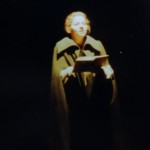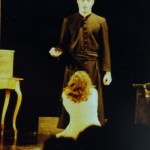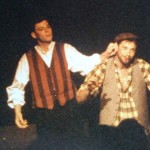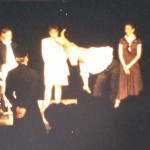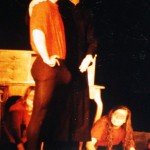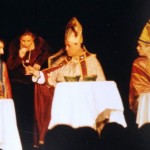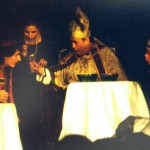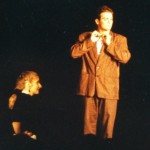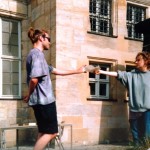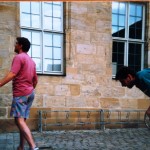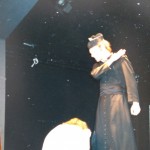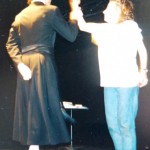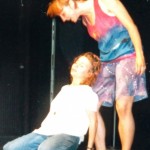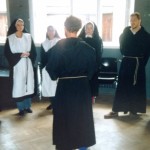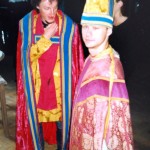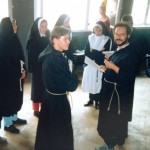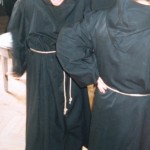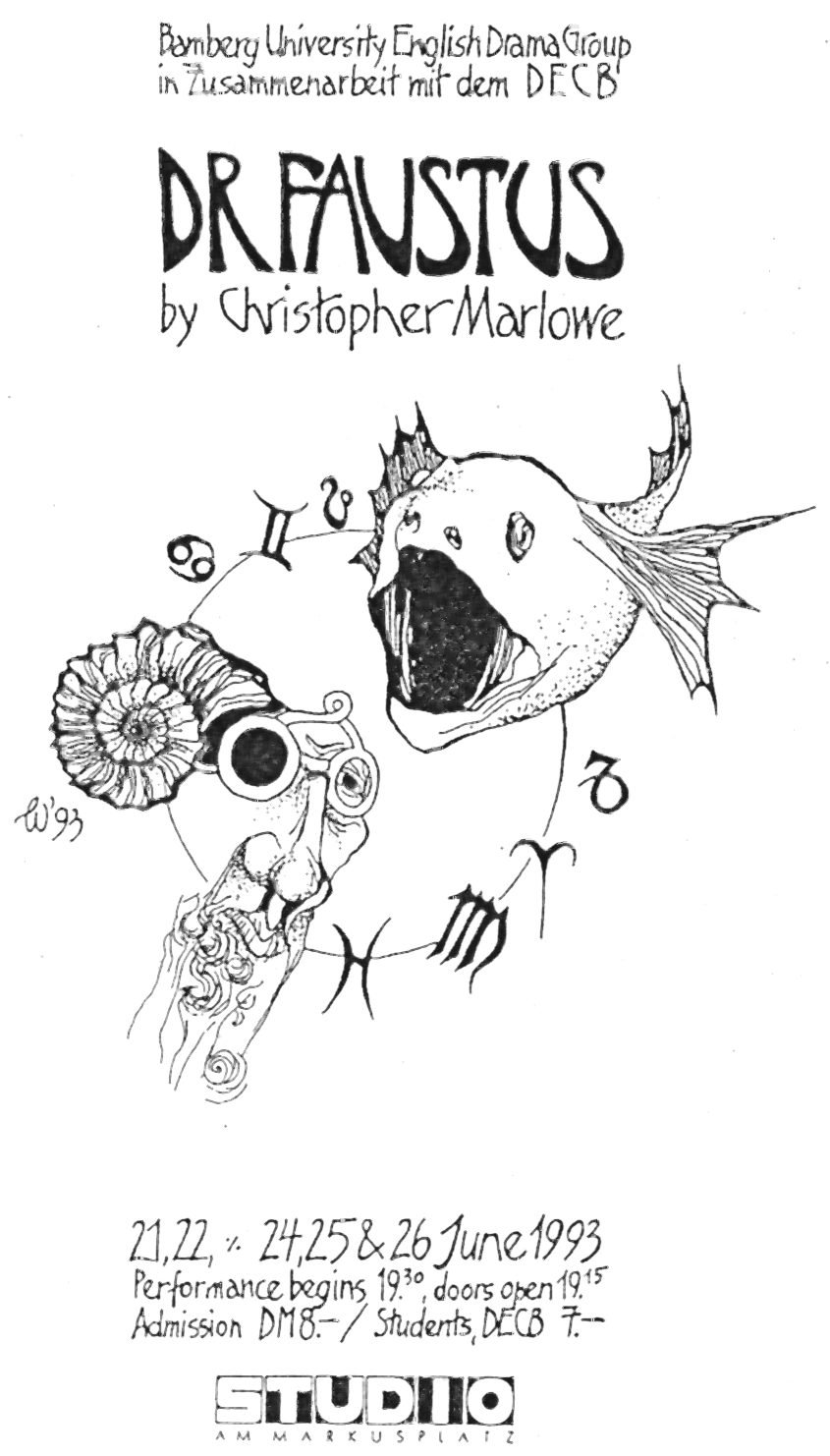
Dr. Faustus - the players
Dr. Faustus ....................................................Sabine Taronna
Wagner, her servant .....................................Martin Salzer
Valdes .............................................................Astrid Günther
Cornelius .......................................................Alice Schmiegowski (two magicians;friends of Dr. Faustus)
First Scholar ...................................................Sandra Ehlers
Second Scholar ..............................................Christine Nawratil
Mephistophilis ...............................................Christoph Futschek
Lucifer .............................................................Lutz Reuter
Belzebub .........................................................Mathias Gressmann
The seven Deadly Sins:
Pride (Hochmut) ....................................... Jacqueline Gamperl
Covetousness (Geiz) ................................ Sandra Ehlers
Wrath (Zorn) ............................................. Britta Bock
Envy (Neid) ............................................... Alice Schmiegowski
Gluttony (Völlerei) ....................................Christine Nawratil
Sloth (Trägheit) .........................................Astrid Günther
Lechery (Wollust) .....................................Petra Tomaszek
The Evil Angel ...............................................Marianne Pouplier
The Good Angel / Old Man .........................Michael Claridge
Rafe ................................................................ Rainer Streng
Robin ............................................................. Melanie Reynolds
Vintner ........................................................... Holger Huber
(servants at a country inn)
Horse-dealer ..................................................Rainer Schlötterer
The Pope ........................................................Volkhart Baumgärtner
Cardinal of Lorraine .....................................Rainer Schlötterer
Bishop ............................................................Holger Huber
Emperor Charles V. ..................................... Jürgen Hoh
Benvolio .........................................................Holger Huber
Martino ......................................................... Jacqueline Gamperl
Frederick ........................................................Lutz Reuter
(courtiers to the emperor)
Duke of Vanholt ............................................Mathias Gressmann
Duchess of Vanholt .......................................Petra Tomaszek
Servant ...........................................................Astrid Günther
Alexander the Great .....................................Rainer Streng
Roxane ...........................................................Christine Nawratil
Helen of Troy ................................................ Britta Mischek
(spirits summoned by Faustus)
monks, nuns, courtiers, devils ...................The Cast
Dr. Faustus - the stage crew
Lights, hey-ho(h) ............................................ Jürgen Hoh, Britta Bock
(following settings by Josef Weierich)
Curious noises, flashes and explosions .......Volkhart Baumgärtner
Devilish disguises ........................................... Ursula Sierek, Britta Mischek, Sabine Pranke, Elke Pohen, Elke Schnappauf, Friederike Weber
Costumes ........................................................ Anette Krauße, E.T.A.-Hoffmann-Theater and The Cast
Front of house ................................................ Isabelle Allemande, Claudia Claridge, Elke Schnappauf
Production Secretary ..................................... Lutz Reuter
Poster Design ................................................. Tini Weidner
Video Work ..................................................... Manfred Haaß
Directed by Michael Claridge
Dr. Faustus - the man
That Georg (or Johannes) Faustus in fact existed, there is no doubt.
Whether he actually formed a pact with the devil is questionable.
What we know is that his reputation as a scholar and reputed magician caused his name to act as a kind of magnet for all the various stories of witchcraft and enchantment going about at the time.
These stories were then collected after his death in a "biography" published in Frankfurt in 1587.
Dr. Faustus - the play
The original Faustus of "THE HISTORIE of the damnable life, and deserved death of Doctor Johann Faustus", the biography mentioned above, was little more than a magician and calendar-maker, Marlowe, trained at Cambridge as a theology student, has portrayed his Faustus with more respect, presenting a scholar of distinction and learning.
However, those familiar with Johann Wolfgang von Goethe's Faust will notice that Marlowe's Faustus is much less serious than his later colleague. As in Goethe, we first encounter the Doctor dissatisfied with the little that study can provide. Human scholarship - whether Philosophy (Aristotle), Medicine (Galen), Law (Justinian), or Theology (Jerome / Hieronymus) - is not enough to satisfy the thirst of knowledge of the great figure of learning. Only Necromancy - black magic - offers new knowledge, the attraction of the unknown.
And yet we see Faustus gradually drift away from true learning, from a desire for knowledge, becoming little more than a second-rate magician, playing childish tricks on the Pope and his company, producing grapes out of thin air like a rabbit from a magician's hat at the circus, a common illusionist interested only in material profit. Faustus in fact expresses the intention to spend the agreed 24 years of devilish freedom in Mephistophilis' company not in winning knowledge but rather in such pleasure and enjoyment that the name of Faustus will be famous through all the countries of the world. The Doctor's progress has been described as that "from a proud philosopher, master of all knowledge, to a trickster, to a slave of phantoms, to a cowering wretch".
Marlowe is more concerned with theology, with the question of determinism as opposed to free will.
The problem that his play confronts is this: If you believe in an all-powerful, all-knowing God, how can you accept the existence of evil in the world which this God has created? Does this mean that God is responsible for Faustus' damnation?
God does not appear in Dr. Faustus. Instead, Marlowe clearly sets out the steps - following the theology of his age - by which Faustus' fate is determined by the Doctor's own actions and words. Marlowe was aware of the different views held at the time concerning repentance [Reue] . Traditionally, this could happen only through God's grace [Gnade] - in other words, man alone could be achieved by an act of free will on the part of the sinner.
Marlowe blends his two beliefs in the final scene of the play.
By the time Faustus calls up Helen, the Doctor is already cut off from God's grace,
(1.) through thirsting after a knowledge that would bring equal status with God;
(2.) through consciously despairing [Verzweifeln], the sin by which man disables himself from trying to get God's grace -
Despair in God and trust in Belzebub
Faustus says early on, adding later,
Damned art thou, Faustus, damned: despair and die
- in other words, go straight to hell;
(3.) through the pact with Lucifer, in which Faustus demands to be
a spirit in form and substance
and so is cut off from God's grace, since a spirit is by definition unable to repent; however, God's forgiveness [Vergebung] is still available. Is Faustus unable to repent at this point because God has removed His grace from the Doctor? (If so, of course, the Faustus' own actions, consciously performed, have led to this condition.)
Or is it impossible for Faustus to have grace because of the refusal to repent; by despairing, is Faustus effectively making it impossible for God to grant grace?
I do repent, and yet I do despair ...
Faustus finally removes all possibility for forgiveness by kissing Helen of Troy. The Doctor has previously warned the Emperor against physical contact with the spirits of Alexander and Roxane, the ultimate sin of bodily intercourse with spirits. Yet this is exactly what Faustus does with Helen, and so makes it impossible for God even to grant forgiveness. Now the Good Angel - representing Faustus' good side - and the Old Man give up their efforts so save the Doctor, their words making it clear that Faustus is guilty of conscious, deliberate self-damnation:
Accursed Faustus, miserable man,
That from thy soul shut'st out the grace of heaven.
Faustus began the play the pride of Wittenberg, longing to be more than human; at the end, finally aware of and accepting responsibility for self-damnation, the Doctor begs to be chanced into something sub-human, into a beast, into air, into drops of water.
Dr. Faustus - the interpretation
It is tempting to produce Dr. Faustus in a melodramatic way, with loud, Wagnerian music, clouds of smoke, frequent explosions and flashes of light as devils hurry back and forth, extravagant costumes, and so on. We have not done this.
Moreover, we have not chosen the longer, more melodramatic version of the play, which has additional scenes probably not by Marlowe, dividing responsibility more equally between Faustus and the forces of hell, removing the burden of self-damnation - to at least some extent - from the Doctor. Instead, we are using the shorter, older, harder-hitting version, in which Faustus is seen as alone responsible for what happens.
The reason for our choice is that we see Dr. Faustus - its theological element removed - as having a message for today.
Like the doctor, we are faced daily with decisions that must be taken, and sometimes simply put them off until it is too late. Like Faustus, we sometimes prefer to ignore the consequences of inaction (the former Yugoslavia?), of deliberate self-delusion ("There are no Neo-Nazis in the former West Germany"), of a conscious disregard of what the future could bring ("When I finish my Abitur / university exams, I'll find some job somewhere, no problem"); like Faustus, we tend to avoid responsibility and refuse to accept the blame for any mistakes that we have made ("It's all the fault of the Government / other countries / my neighbour / my parents / my teacher / today's young people / foreigners").
Faustus ultimately falls because of a refusal to see what is happening, to listen to those wanting to warn, through a conscious determination to take one step further than is advisable... and then another...
Are we realistic when we consider our future - personal or (inter)national? Do we at least listen to the advice of those around us, or dismiss them as old-fashioned, boring or interfering? Do we let ourselves be drawn into dangerous situations without really considering whether our actions are not unwise? Do we critically examine what we hear, read and see, or mindlessly accept what radio, television, "news"-papers, politicians and so on tell us?
Dr. Faustus - the playwright
Born in Canterbury in 1564, the same year as Shakespeare, Christopher Marlowe later went to Cambridge, where he studied theology. On finishing his studies, he decided not to become a priest, and went instead to London as a playwright. In so doing, he broke some University law, and the authorities threatened to refuse him his degree. However, the Queen's Counsil protested, saying that the had been working for Her Majesty, who did not wish him so suffer as a result. All the indications are that his work was some form of espionage for the Queen.
Marlowe was a notably successful dramatist, and also a poet of some ability, although his popularity today rests principally on three works: Dr. Faustus (especially the film version with Richard Burton), The Jew of Malta, and Edward II (recently filmed by Derek Jarman).
We know little else about Marlowe's non-professional life, but more about his death. He was murdered in 1593, apparently as a result of an argument over who should pay the bill for supper. At the same time, rumours arose as to whether Marlowe was in fact an atheist.
Dr. Faustus, however, does not appear the work of an atheist - at least as we understand the word today; moreover, we must ultimately admit that none of the evidence that we possess concerning Marlowe the man is based on anything but rumour and gossip.
( Michael Claridge)
© devilish productions unlimited - 1993
... and the press said ...
Nonnen tanzen im Papstpalast
„English Drama Group" führte Marlowes „Dr. Faustus" auf
Die Notwendigkeit, aus der Not eine Tugend zu machen, gehört zum Alltag einer studentischen Theatergruppe, doch es ist schon erstaunlich, was die Bamberg University English Drama Group, die mit der Aufführung von Christopher Marlowes berühmter „Tragical History of Dr. Faustus" ihr zehnjähriges Jubiläum feiert, einmal mehr auf die Bretter, die die Welt be-deuten, gezaubert hat.
An überraschenden Regieeinfällen fehlt es auch diesmal nicht. Zugegeben - etwas gewöhnungsbedürftig ist sie schon, die Protagonistin (!) des Stücks, Dr. Joan Faustus. Aber wenn man sich erst einmal eingehört hat, erkennt man sehr schnell, daß hier nicht die Not bei der Besetzung Pate gestanden, sondern daß man die Hauptrolle einem großen Talent anvertraut hat. Mit Bravour spielt Sabine Taronna als weiblicher Dr. Faustus die zweieinhalb Stunden herunter, in denen sie fast ununterbrochen auf der Bühne steht, hervorragend assistiert von ihrem Diener Wagner (Martin Salzer) und von Christoph Futschek, den man bisher vor allem als komisches Talent bewundern durfte, in der Rolle des Mephistophilis.
Insgesamt versucht Mike Claridge mit seiner Inszenierung die zeitgenössische Relevanz und Aktualität des Marlow’schen Stückes zu unterstreichen, das ja nicht nur die Selbstüberhebung des Menschen und seine Superbia zum Thema hat, sondern auch ein Stück über aufgeschobene Entscheidungen, verpaßte Möglichkeiten zur Umkehr, Selbstbetrug und das Ignorieren der Zukunft, also über die Sünden der Menschheit ist. Etwas beunruhigt fragt man sich in diesem Zusammenhang allerdings, warum auch die im Stück auftretenden Sieben Todsünden allesamt weiblichen Geschlechts sind?
Im Unterschied zu Goethes Faust, aber ganz im Übereinklang mit den Traditionen des englischen Dramas zeichnete sich Marlowes Dr. Faustus neben den ernsten auch durch eine ganze Reihe komischer Szenen aus, die das ernste Thema burlesk oder parodistisch umspielen oder aber einfach nur als comic relief anzusehen sind. Die Inszenierung bietet hier einer Reihe von komischen Talenten Gelegenheit, ihre Fähigkeiten unter Beweis zu stellen, wie zum Beispiel Rainer Schlötterer als Pferdehändler oder Rainer Streng und Melanie Reynolds in den Rollen der Diener Rafe und Robin. Daß In diesen Szene sogar die Nonnen im Palast des Papstes tanzen, verdanken wir Dr. Faustus’ Zauberkraft und Mike Claridges Einfallsreichtum und Regiekunst. Dem lang anhaltenden Beifall des Premierenpublikums war zu entnehmen, daß das Stück gefallen hat. Weitere Aufführungen finden am Donnerstag, Freitag und Samstag dieser Woche (jeweils um 19.30 Uhr) im Studio am Markusplatz statt.
eme
(Fränkischer Tag vom 24. Juni 1993)
Dr. Faustus - eine Frau
University Drama Group mit unkonventioneller Inszenierung
Mit der weiblichen Besetzung der Hauptrolle „Dr. Faustus" durch Sabine Taronna hat die University Drama Group unter Leitung von Michael Claridge, M.A. (Lehrbeauftragter am Lehrstuhl für Englische Literaturwissenschaft, Prof. Dr. Klaus Peter Jochum) eine ungewöhnliche, aber überzeugende Entscheidung getroffen. Dennoch ließ ein weiblicher Dr. Faustus manche Fragen offen: lst die Liebe zur schönen Helena demnach eine Frauenliebe? Dr. Faustus, eine Gelehrte und Magierin in damaliger und heutiger Zeit: Hier bot die Inszenierung kritische Ansätze.
Aufgrund der aktuellen politischen Geschehnisse hatte sich die Bamberg University Drama Group entschlossen, das Theaterstück „Dr. Faustus" aufzuführen. Das Bild des Dr. Faustus stünde stellvertretend für unsere Zukunft: Er mußte sterben, weil er nicht wahrhaben wollte, was passiert ist, und weil er unfähig war, denen zuzuhören, die ihn warnen wollten. Die weibliche Hauptdarstellerin des Stückes, Sabine Taronna, überzeugte durch ihre Schauspielkraft, wenn auch ihrer dramatischen Atemlosigkeit manche Passagen des Stückes zum Opfer fielen. Anders hingegen bei Mephostophilis (Christoph Futschek), dessen Stärke in teuflischer Gelassenheit lag. Das gleiche gilt für Wagner, „her servant" (Martin Salzer), der den Zuschauer routiniert und mit Stil durch das Stück führte.
Bewußt aus der Inszenierung herausgehalten war Melodramatik, die der längeren Version des Stückes zu eigen ist. Obwohl die Inszenierung der kürzeren Textfassung Marlowes bewußt auf „Wagnerianische Musik, Rauchwolken, häufige Explosionen" usw. verzichtete, war die Personenführung spannungsreich. Durch witzige Regieeinfälle wurde das Stück in seiner Gewaltigkeit gemildert, ähnlich dem Bild, das Marlowe von Faustus zeichnet: Ein Mensch, der durchaus zu kindischen Späßen neigt, wenn auch nur in seinem eigenen Interesse. So trugen auch der Pferdehändler (Rainer Schlötterer) und die Dienerin Robin (Melanie Reynolds) durch ihre komödiantische Begabung zum Schmunzeln der Zuschauer bei. Die tanzenden Mönche und Nonnen sind ebenfalls zu der unkonventionellen Regieführung von Michael Claridge zu zählen. Positiv zu bewerten ist die Miteinbeziehung des Publikums in das SpieIgeschehen. Die „kleine", in dunklen Farben gehaltene Studiobühne des E.T.A.-Hoffmann-Theaters bot das richtige Ambiente für den „schwarzen Magier" Faustus. Schwarz-Rot-Kontraste bestimmten überhaupt das Bühnenbild, dessen Durchgestaltung in den roten Socken der Darsteller endete. Aber mußten es denn gleich rote T-Shirts mit der Eigenwerbung für das Stück sein? Denn Werbung hatte das Stück der Bamberg University Drama Group nicht nötig. Aufgrund der bemerkenswerten individuellen Leistungen konnte „Dr. Faustus" sehr gut aus sich heraus bestehen, was das Interesse des Publikums bestätigte.
Kerstin Altmann
(UB Dialog 4 / 1993)







